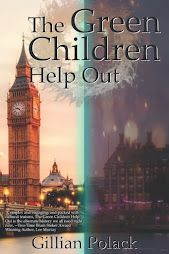 Once I got reading under my belt, I couldn’t do enough of it–books, stories, cereal boxes, comic books. I gobbled up story like I was starving for it, initially uncritically, but fairly soon starting to think about why stories worked/didn’t work for me. In this I had a partner: my brother Clem. He and I amassed a comic book collection of perhaps 2000 well-worn, repeatedly read comics–most, but not all of them DC (the home of Superman and Batman). Clem and I haunted the smoke shop at the corner, where the new comics came in every… I think it was Tuesday… and conspired over which one of us would buy which. We took them home and read the them and then we talked over them. Clem, a far better artist than I will ever be, led the way in discussing the art. One of our favorite riding-on-the-subway games was to identify people who looked like they were drawn by specific artists. Continue reading “Critical I”…
Once I got reading under my belt, I couldn’t do enough of it–books, stories, cereal boxes, comic books. I gobbled up story like I was starving for it, initially uncritically, but fairly soon starting to think about why stories worked/didn’t work for me. In this I had a partner: my brother Clem. He and I amassed a comic book collection of perhaps 2000 well-worn, repeatedly read comics–most, but not all of them DC (the home of Superman and Batman). Clem and I haunted the smoke shop at the corner, where the new comics came in every… I think it was Tuesday… and conspired over which one of us would buy which. We took them home and read the them and then we talked over them. Clem, a far better artist than I will ever be, led the way in discussing the art. One of our favorite riding-on-the-subway games was to identify people who looked like they were drawn by specific artists. Continue reading “Critical I”…
Category: essays
In Troubled Times: Tenaciously Hopeful
I first posted this on January 2, 2017, right after the presidential election. I’m putting it up again as a reminder of how important it is to take care of our mental well-being in troubled times.
Recently, I’ve noticed more articles on staying grounded in joy and hope, even when surrounded by fear. Perhaps such articles have always been part of the general social media discourse and I am only now becoming sufficiently calm to notice them. But I rather think (hope!) this is a trend. In me, it certainly is. After the initial rounds of fear and trepidation, the constant adrenaline wore off. I’m not naturally a person who enjoys being fearful; from my experience training dogs, I suspect it’s not an appealing state for most of us. Some, I suppose, enjoy the “high” of confrontation, even violence, but I’m not among them. Harming others and myself is not where I want to live my life.
I see also posts affirming commitment to action, often in terms of “We Will Fight On!” and I’ve been resisting the urge to jump on that bandwagon. (Also the “Organize the Resistance” brigade.) It all sounds so necessary, a matter of putting my money where my mouth is. And is just as unrealistic for me as remaining in that state of terrified fury.
As unhealthy.
I am not objecting to others following the paths to which they are led. Resisting fascism and protecting the most vulnerable are inarguably vital to our survival as individuals, communities, and a society. I am thrilled that people have the drive and knowledge to organize such resistance. I will be right there, cheering them on. But I won’t be in the forefront.
It’s taken me a long time, coming from a family of dyed-in-the-wool organizers (labor unions, radical politics, war resistance, etc.) to come to terms with not being one of them. Undoubtedly, seeing the cost to my family played a role in my reluctance. I’ve marched in my share of civil rights and anti-war demonstrations, written a gazillion letters, painted an equal number of signs. But it’s not where my heart is. I’ve seen the joy in the eyes of those for whom this is their passion, their “thing.” I want to hug them all and say, “I’m so glad you’re out there, doing this for both of us.”
The fallacy is that making the world a better place is an either/or proposition. Either I’m out there, making headlines by facilitating events of vast numbers for the people’s revolution (as an example), or I’m sitting at home, knitting while Yosemite burns.
The fact is, any social movement happens on many levels. There’s the outward, banner-headline, political level, one that often requires organization on a national or international level. There is a community level, supporting your neighbors, particularly those in need. Soup kitchens are just as necessary as demonstrations outside the White House, although they serve fewer people. Taking care of ourselves and our families is yet another.
Quiet, mindful actions that focus on compassion, justice, and unity need not be limited to small numbers. In fact, outward activism must be balanced by inner activism. We can all find where we are called to act along that spectrum, and we can move back and forth (or in and out, whichever image works best) with circumstances, experience, and energy levels. What a relief to realize I don’t have to pick one thing or level of involvement!
So what speaks to me right now is remembering joy. The year to come is almost certainly going to be full of occasions for grimness if not despair, so I don’t want to start off that way. I want to fill up my “savings account of hope” as much as I can, cultivating those people, places, and things that lift my spirits. I want to never, ever let go of believing we can survive this, kindness and persistence will triumph, and no matter how dark it may seem at the moment, love will win.
I refuse my consent to fascism. I also refuse my consent to despair.
I affirm that I will cling tenaciously – relentlessly – to hope, and I invite you to do so, too.
Thinking about lost culture again
Lost culture is exciting. How can something be exciting when we have lost it? Most times when we talk about loss, it’s in terms of the events that caused the loss. The political pressure, the murders – dire events that add up to big cultural losses. Yet, when a culture is lost because of irrepressible cruelty, it leaves traces. For years, I’ve been watching for such traces, to see how much we can know when remnants of a population have been forced away from their homes and when their lives have to be rebuilt from scratch. I don’t want to hear about horror. I want to find out what we can know about what was destroyed. I don’t look for the names of people: I want to know how they lived.
The first and most obvious relic is, in many cases, linguistic. I was just reading a study of eighteenth and nineteenth century Yiddish in Europe. It traced loan words from cultural areas such as food. Those loan words matched with a bunch of trade records and showed that there was a dynamic and strong Jewish butchers’ industry in the Polish-Lithuanain Commonwealth in the seventeenth century. These days most of the surviving descendants are in the US and may not even eat kosher, but some of the Yiddish has snuck into US English and so, in parts of the US, there is a memory of a life that people once led.
Other records come from the persecutors themselves. The records of the Inquisition have vast repositories of cultural information about Spanish Jews. They used it to technically prove that people were reverting to Judaism or had not dropped Judaism. While conversion to Christianity is by a claim of faith, the Inquisition demanded complete cultural change. Those who held religious power in the empire Spain led was key to maintaining that Jews were impure and that impurity carried down the line to children and to children’s children so people with Jewish ancestry had to be watched forever in case they shifted back to their ancestral religion.
The “convert, leave or die” ultimatum in Spain in 1492 left a lot of people, then, having to forsake family traditions and local customs. It was not safe to wash and wear nice clothes on a Friday, or to send for sweets made by your favourite Jewish confectioner, or even to eat salad on Saturday afternoons. It was possible to be burned alive if any of these small things informed the Inquisition that you were secretly Jewish. Because the Inquisition documented their research into what they regarded as lapsed converts, we know more about everyday life before 1492 as well as after it.
Another hidden aspect of culture is what happens when a whole cultural/religious group is suddenly missing: local culture changes to fill the biggest and most gaping holes. For example, in some places where Jews were sent into exile or mass murdered, the remaining Christian population would suddenly eat more pork. Why? I assume because it proved they were not Jewish and were therefore safe. Big cultural shifts have reasons. This is only one of them, but it’s a deeply-distressing one.
Let me finish on a less distressing note. Superstitions. Some superstitions are folk beliefs that have walked alongside popular culture and religious culture for a while. Others are what’s left when the framework and history for that belief or action is lost. I can imagine that, when we all have flying cars, people will still look both ways before crossing the road, because a hundred years of watching for regular cars instilled a habit so strong we mostly don’t notice we’re doing it.
What look like irregularities in a contemporary culture can tell us a lot about where that culture has been, historically. It’s not the core of my research right now. It’s something I keep an eye on. A lot of the lost elements of culture are the aspects that will bring a novel to life for readers. Understanding how they fit together and create living spaces for real people in our past also helps us write history into fiction more accurately.
Someone sent me to a story the other day because they knew I was interested in alternate Jewish history (because my most recent novel, The Green Children Help Out, has superheroes and alternate Jewish history) and that story rested all of its research on Christian views of history. The concept was a terrific one: what would happen if the relationship between Christianity and Judaism were inverted, with Christianity the minor religion. Making Judaism more Christian both culturally and religiously meant the story didn’t even come close to exploring the concept. The major players were changed, but the everyday culture was not.
It’ll be a while before I can write a novel using these historical explorations, unless I want to follow the path of the story I so dislike. Before I can bring my imagination to play and tell stories based upon hidden and lost history, I need to find as much as I can about the hidden and lost histories. It’s a marvellously fun trail, but the research is happening now. Old and trusty studies aren’t nearly as useful as conferences and conversations with those doing the research.
The Pleasures of Constraint
 My daughter is visiting, and wanted to watch the new Netflix version of Persuasion. She wanted me to watch Bridgerton when she was here over Christmas, but after 20 minutes of making increasingly acerbic comments I absented myself so as not to, as we say in my household, yuck her yum.
My daughter is visiting, and wanted to watch the new Netflix version of Persuasion. She wanted me to watch Bridgerton when she was here over Christmas, but after 20 minutes of making increasingly acerbic comments I absented myself so as not to, as we say in my household, yuck her yum.
Persuasion was not as annoying to me–or perhaps I simply let go of the hope or belief that this would be Austen and just let it be what it was: a good-looking rom-com in Regency dress, with similarity in plot and character names to its namesake, and none of the underlying heft. This is not to yuck the yum of the many people out there who find this exactly what they want. But what do I want?
I grew up with historical films (and TV shows, but when I was a kid the closest to “historical” TV series got was westerns, and even as a kid I was pretty certain that the look and attitude was not what I would have found had I been transported magically to the West in 1880). Continue reading “The Pleasures of Constraint”…
Three Stories
There are, I suppose, as many different stories about why and how a woman gets an abortion as there are women.
Here’s one: In the bad old days before Roe, my mother once drove a friend from New York City to a parking lot in New Jersey, where her friend got into a waiting car. Five hours later the car returned, her friend got out (sheet white and trembling, but okay), got in my mother’s car, and they drove back to the city. She went on with her life, with what residual emotion from the experience I don’t know; I do know my mother was deeply shaken by her small part in it.
And another: I remember several girls in college who got pregnant, before and after Roe. After Roe some things were the same: the secrecy, the collections taken up to help defray the cost, the sympathetic pampering when the girl returned to the dorm. But some things were very different: before Roe there was a well of secret knowledge–all I knew was that someone knew someone who knew a real doctor… and the rest of the process was shrouded in mystery, not as dire or scary as my mother’s friend’s experience, but sufficiently clandestine. After Roe, if memory serves, you had to cross the state line to reach a state where the procedure was legal. But there were official resources on campus which could explain and expedite the process. Still expensive, still secret, but without the gloss of criminality which made a bad situation terrifying.
And one more: mine. Continue reading “Three Stories”…
What’s in a Title?
 I was raised informally; the teachers at my (progressive) grade school were addressed by there first names; I called my parents’ friends by the first names as well–no Aunt or Uncle unless they insisted (only one person–my father’s accountant’s wife–insisted). This doesn’t mean I didn’t treat them respectfully, but it does mean that I grew up expecting a certain amount of reciprocal respect. When we moved and I went to a more traditional school, I called the teachers Miss/Mrs/Mr. I did ask once why we didn’t call all the female teachers Ms, and was told without irony it was because they didn’t have that many young unmarried women on staff. Okay then.
I was raised informally; the teachers at my (progressive) grade school were addressed by there first names; I called my parents’ friends by the first names as well–no Aunt or Uncle unless they insisted (only one person–my father’s accountant’s wife–insisted). This doesn’t mean I didn’t treat them respectfully, but it does mean that I grew up expecting a certain amount of reciprocal respect. When we moved and I went to a more traditional school, I called the teachers Miss/Mrs/Mr. I did ask once why we didn’t call all the female teachers Ms, and was told without irony it was because they didn’t have that many young unmarried women on staff. Okay then.
I believe people should be called what they want to be called (within reason: if you want to be styled Grand Panjandrum, okay, but don’t expect me to do it without an eyeroll). And until invited to do otherwise I still call doctors “Doctor,” regardless of whether they are MDs, DDS, PhDs, or any of the other long list of doctorate degrees. My father-in-law had a doctorate in Education, and while he didn’t do it often, he occasionally would insist on being “Doctor Caccavo.” Because he By God worked for that degree, and the prerequisite degrees, all while supporting a family.
For what it’s worth, in the UK, up until very recently, some medical doctors were Dr. and some were Miss or Mrs. or Mr. Allow me to put my Medical History Geek Glasses on: in the Middle Ages there were three classes of medical practitioners: doctors, surgeons, and apothecaries. Doctors were the ones who had studied medicine; they’d gone to school and learned all the theories. They did not lay hands upon the patient except in the most basic way–that was for assistants, or for surgeons. Surgeons were tradesmen: they used their hands, they apprenticed, learned the skills required, and practiced (some cut hair and pulled teeth as well; Sweeney Todd may have been a Demon barber, but he was also expected to be a dentist as well). Even up to the beginning of the 21st century, aspiring surgeons were plain Mister or Ms. until they finished medical school–then were briefly Doctors, until they finished surgical training and passed their exams, at which point they returned to Mister/Ms. again.
Don’t get your knickers in a twist about doctor. Continue reading “What’s in a Title?”…
Exploration and early science fiction
It’s Monday. (I feel very witty when I say things that appear obvious.) There are twists and turns every Monday and this week the small twist is that I’m actually writing this on Monday. Normally I write my Monday blog post very early Tuesday morning, and still post it on US Monday but today… I have nine minutes now and no time then for two hours and then a full hour before midnight, so I’m writing my Monday post on Monday.
The second twist (the big one) is that I’ve only read a bit of the book I’m introducing you to. I don’t have time to finish it right now, and I’m too excited by it to wait to write about it.
There’s a story behind why it’s open on my machine. Of course there’s a story. Someone very proudly told me that Mary Shelley’s Frankenstein wasn’t the first work of science fiction. They claimed something from the eighteenth century as the first. I instantly wanted to argue, because the eighteenth century is too early and too late. Approaches matter, and there are at least half a dozen different arguments for this work or that work to be considered science fiction.
It all rests on definitions. What is science fiction? What is fantasy? Are we only talking about modern novels, or are we talking about other types of narrative? There’s a terrific Medieval life of Alexander, where Alexander explores underwater in a bathysphere and loses to the Amazons when he invades and is fed dinner by them and… I talked about it just the other day at a science fiction convention. It’s not one book. It’s many different types of stories in many different books. It’s also very well studied, even though it’s not known nearly well enough in some science fiction circles. Here’s a bibliography prepared by people who know more about it than me (I’ve read two versions, only.)
One can go back further than that, much further, or go forward. There are stories in many languages and from several continents. The trick is to start looking.
Two days ago I decided to look for French books from the seventeenth century. I already know the work where Cyrano goes to the Moon, and it’s fun, but where one book like that is written, there must be others. I used to know several others, but my brain sometimes forgets everything (I think it does it on purpose, to annoy me) so I looked again. I found several things I once had known, and one single book that’s new to me and that’s surprisingly close to home in a number of ways. It’s the one I want to read when I do not have time.
It’s the story of a voyage to Australia. It was published in 1732. Australia was known to many people by then, not least of all the people who had already been living here for the last tens of thousands of years, but Europe, for the most part, thought of it as unknown and exotic. Bits of it had appeared on European maps, and the region now known as South East Asia had contacts, especially up north. So did all the region north of Australia (Papua and PNG in modern parlance), and quite possibly New Zealand and maybe even China. But Europe didn’t pay much attention to what most of these places thought of the southern continent and was only just in the throes of making its own discoveries.
When I was at school, I was taught that there was no knowledge of Australia in Europe until the eighteenth century. Since then, however, the maps from the Dutch and Portuguese have demonstrated very much otherwise. Parts of Australia have been known to parts of Europe since at least the fifteenth century. Here is a map that reflects stuff from an earlier map, to show what was known to those Europeans who had access to this very specialised knowledge.
Of course, contact with Australia from nearby places dates back long before then. One of my students a few years ago was Indonesian and her family had stories about contact with Australia. We visited an exhibition at the National Museum and she was able to point to her island and then to where people from her island travelled to, for trade. How long has that trade been happening? I need to check out archaeological studies, her island began regular contact with northern Australia a long time before Europeans even thought to come to the Great Southern Land.
Before those early maps from Europe, there was talk about Australia. In fact, Europeans have been talking about Australia since at least the time of Cicero. Cicero wrote about it in his science fictional “Somnium Scipionis” (“The Dream of Scipio”), which was part of his De Re Publica where Scipio Africanus went to Mars and saw the world laid out. Australians were there as antipodeans, people who walked on the opposite side of the earth. Macrobius took that dream in the fifth century and wrote commentaries on it and those commentaries were used as geographical explanations throughout the Middle Ages.
A fictional account of someone voyaging to Australia in the seventeenth century has, therefore, a really solid background. It was a story based on things other people knew and accepted. That’s why I want to read it. I want to know what people thought about this country at a time when most Europeans saw it as an intellectual conceit or a place only specialist traders knew about.
The preface explains that the writer knew a fair amount about modern (for that time) geography. He makes it very clear that he’s not talking about Java, nor about the Americas. He even names explorers to demarcate their routes and interests. To me, this is the stuff that science fiction is made of. Take current knowledge (proving one’s cutting edge understanding) and then extrapolate and write fiction inspired by it. The extrapolation is invention, and it says more about Europe than about Australia, but it’s no less interesting for that. It describes an invented Australia in the year 1610. The land, the writer says, is more fertile and more populated than Europe.
Now you know why I want to read it. I wish I had time. It’s on my computer, however, and if ever an excuse arises (if someone tells me “I want a talk about this book” or “Give me an article”) then I shall be very grateful to Professor Ron Ridley who gave me the capacity to read seventeenth century French. Let me tell you about that, and then sign off, because it’s heading for midnight here and I do like the thought of finishing my Monday post on Monday itself.
I was doing third year History, as an undergraduate, and I’d been allowed into a fourth year class on Roman historiography, because it wasn’t going to be offered the following year. Ridley noted that I was doing historical French as another subject, and set me an essay that used it. I had to read and analyse 22 volumes of seventeenth century French in a collection of rare books, with only one article about them (in modern French) to help me. It was a lot of work. So much work… By the end of it, I could read seventeenth century French perfectly well. Even if I have no other skills to my name, I have this one. And now that these early novels are available on the web, I have a reason to rediscover that odd little skill of mine. All I need is someone to give me an excuse…
An Angry Librarian
 Certain shows (I’ll spare you the list) lodge deep under my skin–The Music Man, which I saw last week on Broadway, being one. I grew up with the cast album (Robert Preston and Barbara Cook) and the film (Robert Preston and Shirley Jones). I had never seen it staged, however, so when the opportunity arose to see a revival with Hugh Jackman and Sutton Foster, I leapt at it, credit card in hand. I want first to say that I liked it a lot. That being said…
Certain shows (I’ll spare you the list) lodge deep under my skin–The Music Man, which I saw last week on Broadway, being one. I grew up with the cast album (Robert Preston and Barbara Cook) and the film (Robert Preston and Shirley Jones). I had never seen it staged, however, so when the opportunity arose to see a revival with Hugh Jackman and Sutton Foster, I leapt at it, credit card in hand. I want first to say that I liked it a lot. That being said…
It would be very easy for me to go one of two ways with this new production–uncritically adore it because it’s The Music Man, fer chrissakes, or worry away at it because it’s not the Music Man I grew up with. Short of exhuming Robert Preston and Barbara Cook, or flying Shirley Jones in (at 88, dancing the Shapoopi might not be on her to do list), you’re not going to give me the Music Man I grew up with. And anyway, times have changed and certain things are creaky–even when they might have been “accurate” for the time in which the story is set. I have, however, seen essays basically tearing this production down because Jackman isn’t Preston and–even worse, in one writer’s mind–Foster isn’t Cook.*
I have a couple of bones to pick, sure. The show’s tempo was fast–here and there they could have slowed the tempo down a titch, to useful effect. I loved the woman who played Mrs. Paroo, but wish they’d cast someone younger. Hugh Jackman, who was clearly enjoying himself, wasn’t quite the Harold Hill I wanted him to be (not Preston, but maybe a magnified version of himself?). But none of those quibbles got in the way of the things I liked–nay, loved.
You know the story, right? Continue reading “An Angry Librarian”…
Hometown
(This essay is several years old… but I’m going East for my high school reunion next week, and am thinking about New York City, so.)
I love cities. I love my home town so much I blew it up. Really. The Stone War, published in 1999, was at its root a discussion of love of place and love of person (and where they intersect) and a mash note to my hometown and favorite city in the world, New York.
I know New York is not everyone’s cup of tea. Some people don’t care for cities, no matter how glorious. Not everyone born a New Yorker loves it: my brother was born there and hates it. Not everyone from out of town hates it, either. Some people get off the bus or the train or the helicopter and take a breath and just know they’re home. The Stone War was, in part, my attempt to describe what I find so profoundly lovable about NYC. If you don’t have time right now to read an entire novel, here are Five Things to Love About New York:
Its compression. New York isn’t a small city, but compared to many cities without its geographical limitations it’s compact. That’s part of why it’s such a vertical city–when you can’t spread out, you spread up. New York is like a field of caves and canyons and mesas, all man made. The city uses all its space–below the ground (as they say in the song, the people ride in a hole in the ground) up into the sky, packing more art, life, food, confusion, beauty, ugliness, and generosity in a square foot than you’d think the laws of physics would allow.
Its structures. The protagonist of The Stone War is an architect for good reason. I wanted someone who could walk around the city with a sense of its structure and physical beauty. Every city has architecture: New York has, with the possible exception of wattle-and-daub cottages and igloos, just about every imaginable kind of architecture, from every year of the last 300 or so, jumbled together, full of surprises. The city’s a palimpsest, bits of forgotten architecture and culture shine through. When a building is being razed, look at the walls of the structures next to it and you’re likely to see a 1920s painted advertisement or a bit of lost ornamental detail. The house I grew up in (seen in the watercolor above painted by my father) was built in 1837. Down the street were buildings older and newer. The city changes constantly and stays the same.
Its people. The myth, perpetuated by sitcoms and movies, is that New York is a scary place full of nasty, hardbitten people. New Yorkers are like M&Ms–hard shell and a melty core. Living in a place as chock-full of humans as it is, you have to develop a bit of a shell. Pierce that shell, ask for directions, say, or lose a contact lens, and suddenly you’ve got people coming out of the woodwork to help (when my older daughter was very young and still dealing with potty training, it wasn’t her babysitter who got her to leave the sandbox in Central Park to find the bathroom; it was Katie Couric, who was in the playground with her kid and intervened when she saw Julie doing the potty-dance). Cultures? Neighborhoods? Foods? Whaddaya want? Yeah, we got that.
Its weird. I was working on 53rd and Lexington a couple of decades ago when, around Christmas time, I saw a young, preppie-looking guy on the sidewalk with a bunch of bullwhips around his neck like a wreath. Rather laconically, he was switching one and calling “Whips! Perfect stocking stuffer. Whips! Bring one home to the wife or girlfriend. Whips…” And no one batted an eye. There’s the strange guy with the world’s most beat up saxophone who used to get on a subway car, mangle the first couple of bars of the theme to The Twilight Zone, then announce that the Aliens in his Head would force him to keep playing unless we contributed a little something to his Operating Fund (this guy wasn’t crazy, just canny). Or the guy whose panhandling come-on was “Can you spare $27,000,000 for a Boeing 747? No? How about a dollar for some coffee?” New York does colorful in its own distinct way.
Its courage. When I was a kid and there were blackouts or blizzards or subway strikes, the city managed to make kind of a party out of it. My father directed traffic at 53rd and Madison, where he worked, for two hours during a blackout, then walked 40 blocks home and was smiling when he got there. Civic improv, you might call it, and New Yorkers are pros at it. Even when things get really grim. On 9/11 what I remember is the little things…going to the market that day and watching as, over and over, people approached a staple–bottled water or toilet paper or milk–and hesitated, and then took just what they needed for now. In the days afterward, people kept going to work and living their lives. My daughter had a soccer game the first Saturday after the Event, and the city had been eerie and quiet for days, but there all of us were on a perfect autumn day, watching our five-year-olds play clusterball and willfully not looking at the sky.
When I go back to New York I become livelier and more relaxed, more myself. In Greek myth, Antaeus was the son of Gaia; he was hard to beat in a fight because every time you knocked him down, he was revived with contact with Mother Earth, bounced right back and waded in, swinging. New York City is my Mother Earth, every gritty, crowded, chaotic, insanely human bit of it. There are eight million stories in the Naked City, and for a writer, that’s paradise.
Mothering, Creativity, Chaos
 Inspired by Nancy Jane Moore’s piece last Friday, I downloaded The Baby on the Fire Escape.* I’m working my way through it–it is wonderfully written, dense and thoughtful, with much to digest. As Nancy says, it’s about mothers as creators, about the ways that women have found to do creative work, sometimes in the interstices of motherhood, sometimes by turning their backs on motherhood, sometimes working with support, sometimes going it alone.
Inspired by Nancy Jane Moore’s piece last Friday, I downloaded The Baby on the Fire Escape.* I’m working my way through it–it is wonderfully written, dense and thoughtful, with much to digest. As Nancy says, it’s about mothers as creators, about the ways that women have found to do creative work, sometimes in the interstices of motherhood, sometimes by turning their backs on motherhood, sometimes working with support, sometimes going it alone.
When my older daughter was about two, my husband held the fort and I went to see the Kenneth Brannagh Frankenstein. Which was meticulously true to the source material, and which infuriated me, because I find the source material infuriating. For all its pondering on the nature of creation, Frankenstein is about a parent who creates life, then freaks out, drops the “baby” and heads for the hills. Which he can do because, well, he’s a man. Continue reading “Mothering, Creativity, Chaos”…

